 May 22, 2024
Persona
May 22, 2024
Persona
This blog was updated on September 16, 2024 to reflect recent changes and provide more accurate information.
Google’s new AI-powered search result, AI Overviews (previously called Search Generative Experience or SGE), promises to be a major development in Search Engine Optimization (SEO). Due to the rapid emergence of several AI-enhanced search engines including Google AI Overviews, BingGPT, and seemingly more every day, we have spent the past year analyzing the potential impact of AI powered search engines on higher education content marketing and how to optimize for AI Overviews.
In this blog, I share some of the strategies we’ve learned from this analysis to help you future-proof your website content, ensuring it consistently appears in organic search results, no matter how AI changes the search game. For a deeper dive into this topic, you can also watch my recorded webinar on Optimizing Your Webpages for Google’s AI Search Generative Experience.
What are AI Overviews and Generative Search Engines?
Google’s AI Overviews provide an interactive response bubble to certain keyword searches, offering a summarized answer above traditional organic search result links. These AI Overviews source information from various websites, offering panels and snippets designed around the user’s search intent.
AI algorithms have subtly influenced search engine ranking mechanisms for years, but new generative search engines like Google’s AI Overviews bring this technology to the forefront, making it visible on the search results. While not all queries trigger an AI Overview, studies show that AI Overviews appear in some form for 98% of education-related searches.
How AI Overviews Appear in Search Results
Google’s AI Overview is a full-width feature that appears above traditional search results as part of an experimental “Search Generative Experience.” Other recent generative search engines on the market like Perplexity have taken the same approach. Typically, the AI-generated search results include:
- A quality warning: “Generative AI is experimental.”
- The generated answer result, which includes text paragraphs, lists, or both.
- Clickable thumbnail panels to relevant web pages presented in a horizontal carousel.
- Links to source websites within the answer bubble, seen if citation carrots are expanded.
- Suggested follow-up questions or a chatbot-style interface
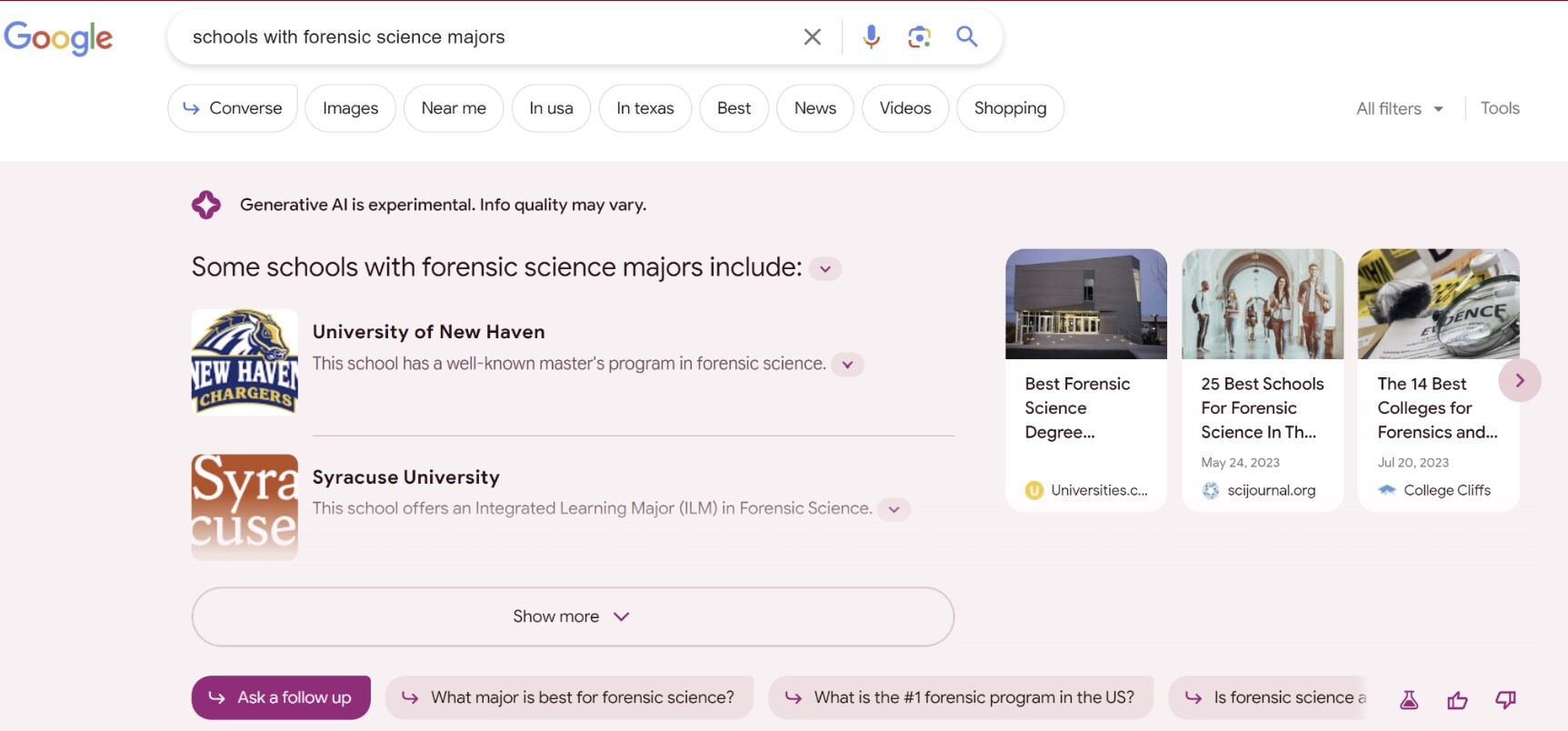
The Most Valuable Aspects of AI Search Optimization for Higher Education
For higher education marketers, the most compelling aspect of optimizing for AI Overviews and generative search engines is earning organic traffic and visibility from the featured links and panels. When pages for academic programs or admissions or blogs published showcasing your brand show up in the carousel or as citations in AI Overviews, it makes your institution more visible and showcases your expertise and reliability.
For example, a search query about the value of an associate degree in business could return career paths and job titles, accompanied by clickable panels linking directly to sources, including your blog “Benefits of an Associate in Business Administration.”
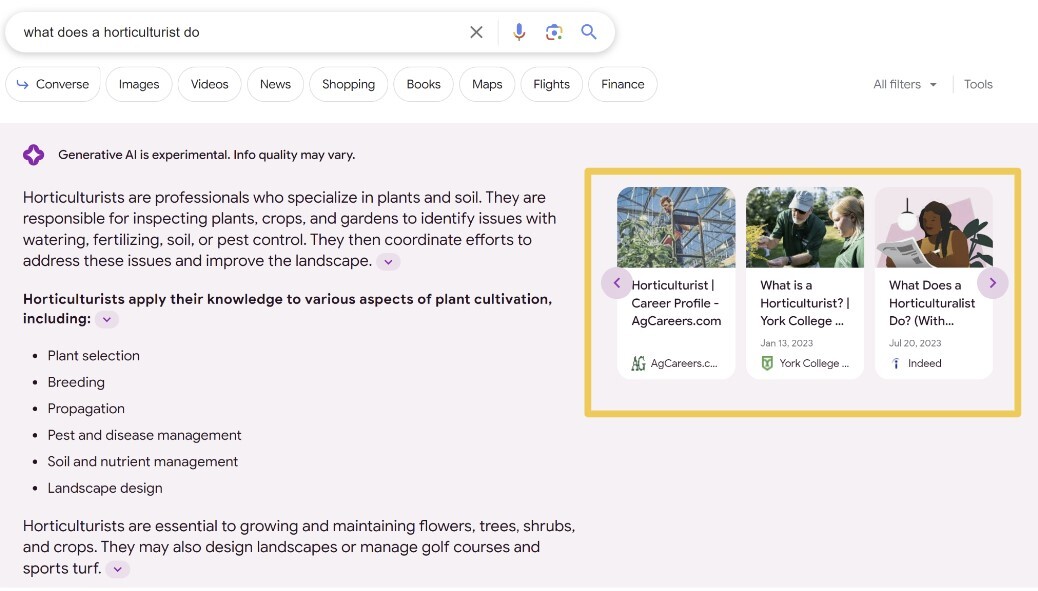
Ordered and unordered lists are also really helpful for making college and university websites more visible. Instead of just text-based answers, the AI search engine result can produce a structured list of school logos and names, often accompanied by location and map components or short snippets of information for each entry.
For example, for a search term like “colleges in Pennsylvania,” a list is returned with large school logos and school names, with location and short snippets of information for each entry.
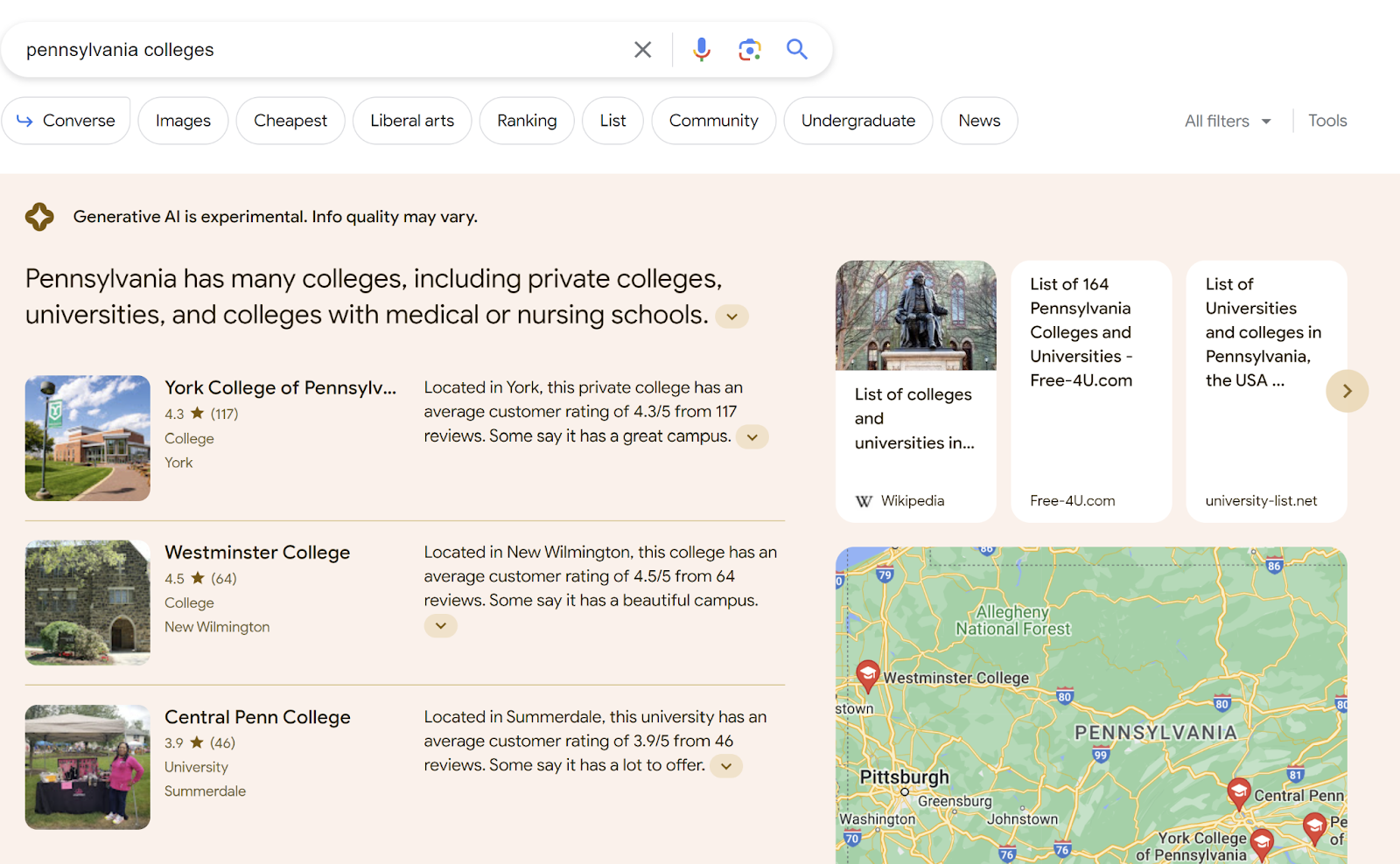
Types of Higher Ed Content Appearing in AI Overviews
Currently, various iterations of the Google AI Overview feature content from higher education institution websites, often in response to searches related to a topic of study, degree path, or career field. We have noticed that the kind of content shown and how AI search results are organized can change depending on where someone is in the enrollment funnel.
Academic Content
When prospective students use general search terms such as unbranded, short-tail keywords related to academic degrees, programs, and majors, it can help them discover your college or university for the first time.
If the academic content on your website, including department and program pages, is effective, helpful, and optimized for SEO and web writing best practices, it may be cited in the AI Overview. This could be within a text answer, within the panel carousel, or within a structured list of brands.
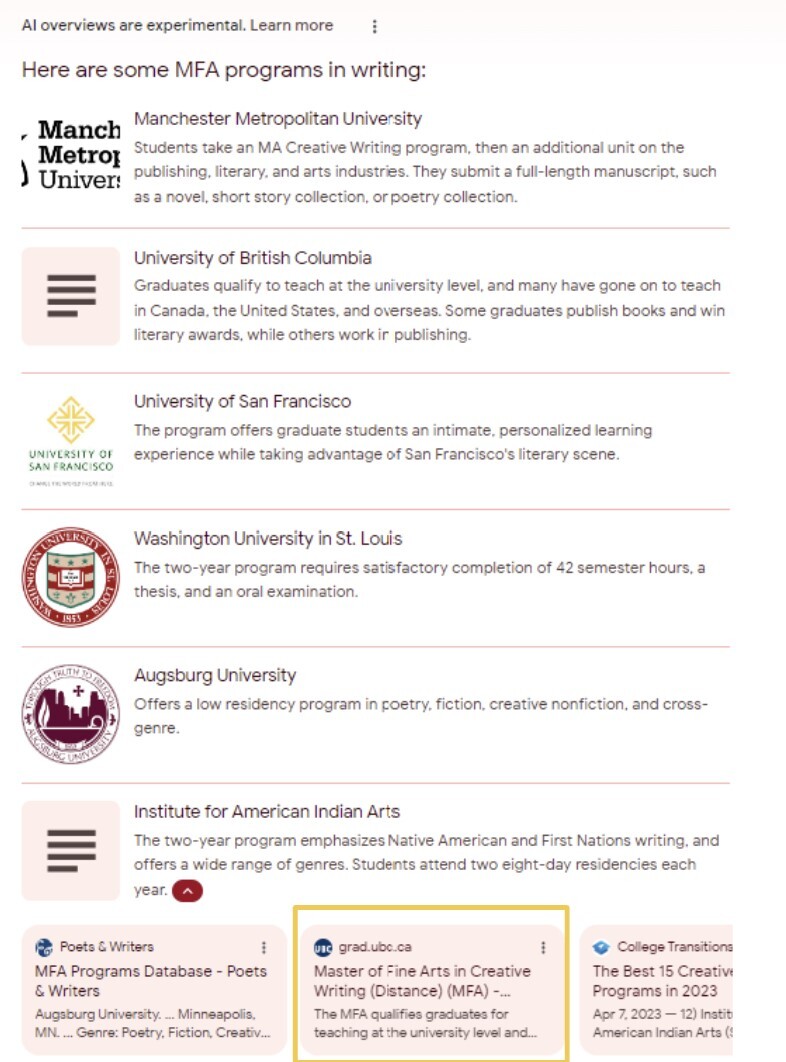
Admissions Content
Prospective students often have questions about admission requirements, deadlines, applications, costs, and financial aid. The Google AI Overview and other search engines cite higher education admissions content from pages such as undergraduate, transfer, and graduate admissions home pages, blogs, and academic program pages. Based on what we know about how AI algorithms scan and understand website content, using clear headings and internal links can optimize your key pages for generative engine searches.
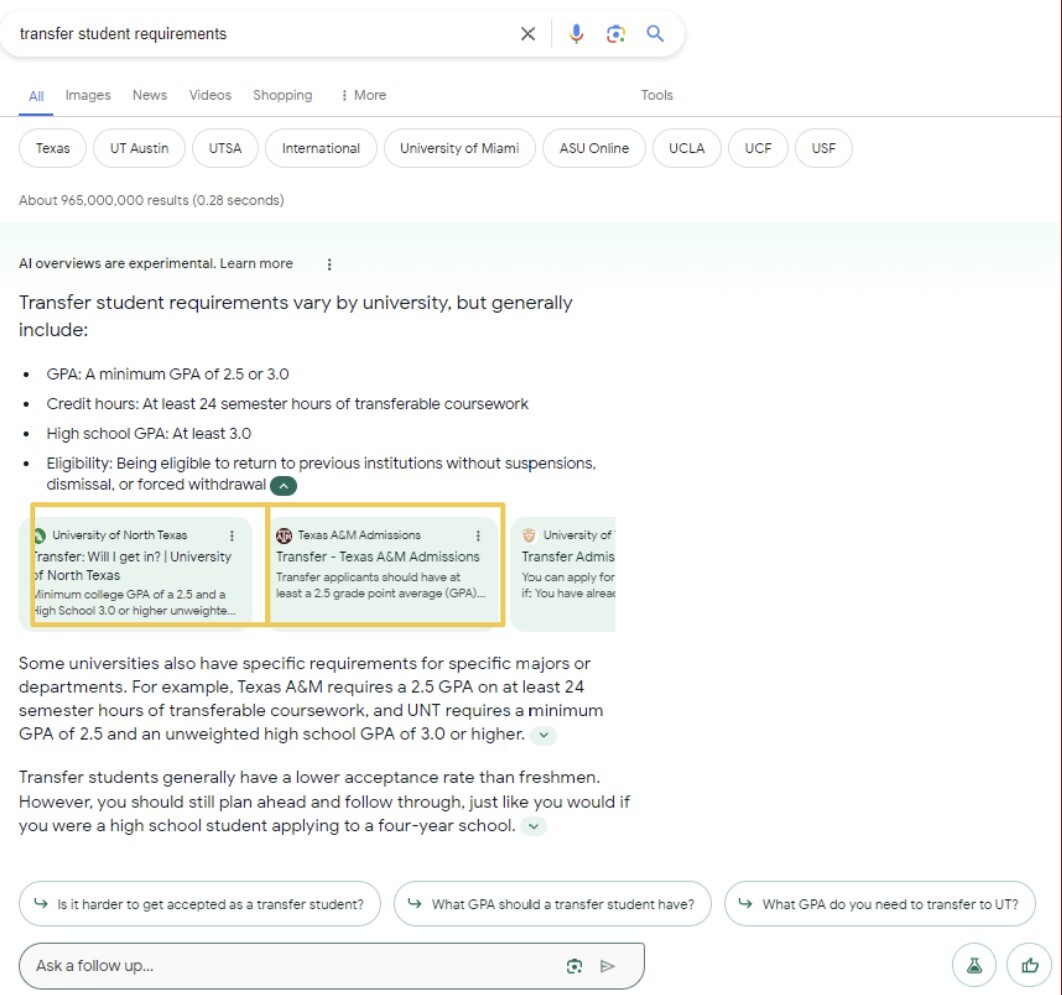
Evergreen Thought Leadership Content
Early in undergraduate and graduate students’ research stages, it’s common to search questions like “What can you do with a biochemistry degree,” “Should I get a graduate degree in accounting,” etc. The AI Overview often supplies citations to comprehensive, long-form blogs and articles on evergreen topics. Creating blog content that answers these questions can help widen the funnel of prospective students who can benefit from your knowledge and become familiar with your brand.
Tip: Place thought leadership pages either in a relevant category of a dedicated blog section of your website or in/under the same navigation folder as the academic area or program it relates to.
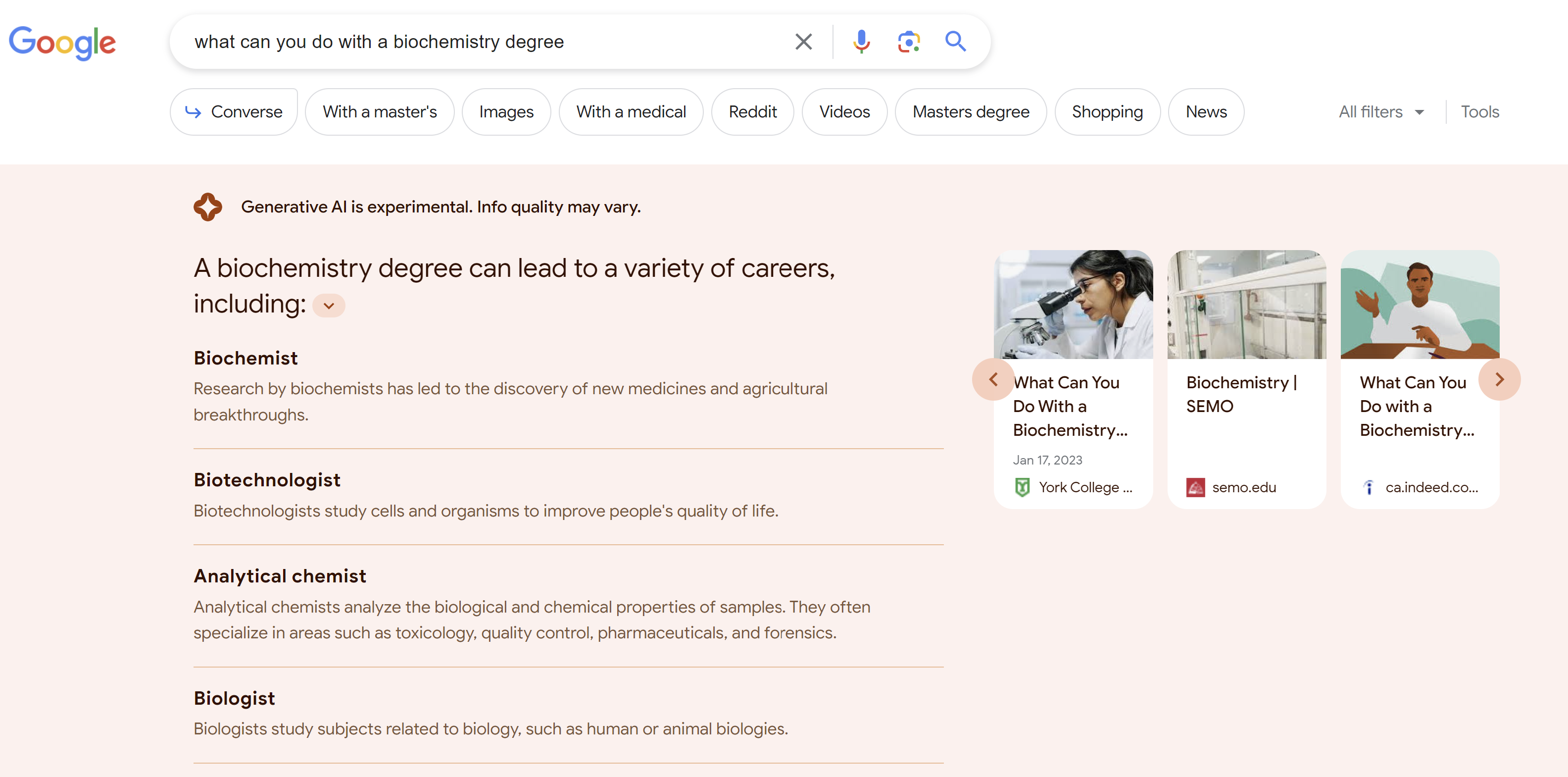
Biggest Implications for SEO in Higher Education
Generative AI search engines that leverage LLM technology introduce profound implications for SEO in higher education, emphasizing a shift towards more conversational, context-aware search experiences. Key takeaways include:
- Conversational and Contextual Search: Chatbot-style tools like Google Gemini remember past queries to offer personalized results and suggestions based on earlier interactions.
- Question-Based Searches: AI Overviews impact how users search by influencing search behavior to take on a longer-tail, complex construction.
- Impact on Student Recruitment: Sources in AI Overviews often differ from the top organic search results, giving colleges and universities a new avenue to outshine competitors and directly connect with prospective students.
How to Optimize Your School’s Web Presence for AI Overviews
Keeping up with detailed keyword research and following SEO best practices like optimizing metadata and using headers is still crucial. However, as AI-powered search engines evolve, it’s becoming more important than ever to be seen as an authority on your topics. Your content should radiate expertise and trustworthiness, emphasizing your institution’s expertise in specific areas.
Create Expert-Driven Content
Creating authoritative content builds on foundational SEO principles of Expertise, Experience, Authoritativeness, and Trustworthiness (E-E-A-T). Publishing thought leadership content that showcases perspectives from faculty or other subject matter experts significantly boosts the credibility of your higher education website.
Whether faculty members write blogs themselves or the marketing team creates content based on their insights, it’s crucial to focus on your institution’s key areas of excellence. For example, if your institution is renowned for its School of Nursing and Health Sciences, concentrate on producing content in that area and other main pillars of expertise. Highlight the latest advancements in nursing or explore career paths in health sciences to showcase your institution’s strengths.
Optimize for Long Tail Keywords and Conversational Search
AI-powered search engines respond accurately to complex queries, such as “What are some small colleges with internship programs in the New York City area with no application fee.” Pivot your keyword research to identify question-based, long-tail search terms and use them to enrich your content as an AI Overview SEO strategy.
Focusing on question-based and long-tail searches helps you understand what information is most important to your potential students or other audiences. You can then strategically incorporate this content in a way that allows AI search engines to scan and display your website. Pay attention to site architecture, page headings, and internal linking to achieve this.
Tips for Keyword Research Strategy for AI Overviews and Generative Search:
- Use Google Search Console: Apply the query filter in Google Search Console to find keywords and phrases with question words like how, where, when, what, and why.
- Leverage Third-Party Tools: Tools like Answer the Public help identify questions your target audience is asking.
- Assess Content Needs: Identify content that answers the question-based keywords and determine if it exists on your site or needs to be created.
Optimize Site Architecture and Linking:
- Logical Structure: By organizing your website logically and using H-tagged headings effectively, you can make it easier for people and AI search engines to find detailed information, like application steps and tuition costs, that might be buried deeper in your site.
- Optimize Internal Links: Use link anchor text to help generative search engines find and display important information.
By focusing on long-tail keywords and organizing your website’s content, you position your institution to be cited in AI Overviews and future AI search engines as technology evolves. This enhances visibility and establishes your site as a resource.
Pay Attention to Local SEO and Social Media
Generative search engine results often integrate social media posts, maps, business reviews, and user perspectives with traditional web results. For higher education searches, AI Overviews can showcase logos, photos, and detailed information from your Google Business Profile. User reviews can also be featured, especially in local searches listing college and university brands.
Strengthening Local SEO:
- Incorporate local keywords into your web content to boost local SEO, making your institution more discoverable in “near me” or location-based searches, like “colleges in Minnesota.”
- Embed your full brand name and relevant keywords into social media profiles and captions—not just hashtags—to improve visibility and ensure recognition across search and social platforms.
Maintaining Online Profiles:
- Keep your Google Business Profile, Wikipedia page, and profiles on platforms like CollegeXpress up to date.
- Check for outdated information, respond to reviews, and optimize your Google Business Profile with campus photos, current information, and relevant categories. Tip: Use the “products” feature for academic programs. Tip: Stay up to date with how to submit requests for changes to your Google Business Profile.
Optimize Images and Videos for Search
Nearly all web pages featured in the AI Overview citation panels include images, and YouTube videos can also appear. As more users get their answers right on the search results pages, grabbing their attention through multimedia is key. Follow best practices for optimizing images and videos to enhance the relevance of your content and increase your chances of appearing in AI Overviews and other AI search results.
Optimizing Images:
- Use strategic, descriptive alt text.
- Ensure file names are relevant.
- Optimize file sizes for fast loading.
Optimizing Video Content:
- Embed keywords in video titles, descriptions, and your YouTube channel overview to improve discoverability.
- Link to relevant web pages from video and channel descriptions to drive traffic and reinforce the relationship between your video content and your institution.
Embedding optimized YouTube videos on your website can increase views and further elevate the chance of your institution’s videos appearing in generative engine search results as well as traditional organic search results on Google and YouTube.
Face SEO for AI Overviews Head-On
As generative AI and search engine technology rapidly advance, higher education marketing, communications, and enrollment professionals must keep pace. AI search engine optimization in higher education is teeming with potential, poised to forever change the way institutions connect with prospective students. It’s crucial to focus on improving visibility and brand awareness by optimizing for AI Overviews to deal with possible drops in website visits and click-through rates.
Higher education marketers who embrace the unique capabilities of Google’s AI Overviews and other emerging AI search engines like Perplexity are equipped with a powerful resource to enhance their institution’s online presence and discoverability. This not only amplifies the reach of their content but also opens new avenues for connecting with potential students in meaningful and impactful ways.
Stay tuned for further insights and analysis as we explore the unfolding story of AI search engine optimization and its role in shaping the future of higher education marketing.
Start a conversation today to learn how our team of expert strategists can help your institution navigate these changes, future-proof your website with AI search engine SEO strategies, and enhance your online engagement strategies to attract more prospective students.
